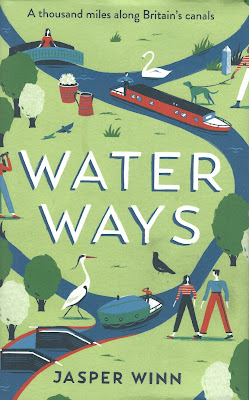The book festival event was early on a sunny Sunday morning and it consisted of an illustrated talk that was essentially a snapshot of the book's contents. We found the talk Jasper fascinating and enjoyably familiar; he covered a lot of ground. It was also obvious from the questions posed from the non-boating audience that they were also enthused by the presentation. I just had to purchase a copy of the book and have it signed.
During the talk I wondered if, being a canoeist, if Jasper was aware of the books William Bliss. After the talk and the signing, I chatted to him about this. He appeared to recall the name but there is no reference to Bliss in the book.
Unlike, for example, Terry Darlington's books that consist of a story of a voyage, Jasper's book not only reports on a series of journeys along canals, but it weaves into the chapters all the history of canal construction, the story of canal people through the centuries, the remarkable story of how our canals were saved, and the modern canal scene. Jasper previously wrote about his journey by kayak around Ireland and he uses this mode of transport on several journeys, but notably along the Kennet & Avon. As an example of how the book is constructed, he describes a walk along the Huddersfield Canal but combines it with a discussion on the lives and roles of navvies and the history of Standedge Tunnel.
I did note one small editing problem on page 214. The text states "I cycled through Bruce Tunnel". Jasper clearly kayaked through the tunnel, after all there is no towpath. Mind you, in a book of this type with over 300 pages production slips like this are inevitable.
The see that Water Ways is available from the usual on-line outlets and also available as a download.

